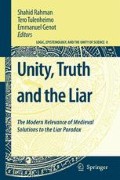Attempting to resolve the Liar paradox in a simple and straightforward way, Stephen Read suggests a modification of Tarski's famous truth-schema that he claims turns the Liar paradox into an innocent sentence, which is simply false. In my note I examine the way Read tries to solve the paradox and argue that some doubts can be raised regarding the successfulness of his attempt. I analyze his project from two independent points of view. First, I try to shed light on some weak points in Read's argument, then I present my own arguments to the effect that any revision of Tarski's truth-schema can, in principle, be only a part of the solution to the Liar paradox.
Access this chapter
Tax calculation will be finalised at checkout
Purchases are for personal use only
Preview
Unable to display preview. Download preview PDF.
References
[1] Boolos, G. (1995).The Logic of Provability. Cambridge: Cambridge University Press.
[2] Goldblatt, R. (1992).Logics of Time and Computation. Stanford:CSLI.
[3] Goldstein, L. (1986). Epimenides and curry.Analysis46(3): 117–121.
[4] Kleene, S.C. (1964).Introduction to Metamathematics. Princeton:D. Van Nostrand Company, Inc.
[5] Kripke, S. (1984) Outline of a theory of truth, in: R.L. Martin (ed.)Recent Essays on Truth and the Liar Paradox. Oxford: Clarendon Press, pp. 53–81.
[6] Langford, C.H. and Lewis, C.I. (1959).Symbolic Logic(2nd edition). New York: Dover.
[7] Priest, G., R. Routley, and J. Norman (eds.) (1989).Paraconsistent Logic: Essays on the Inconsistent, München: Philosophia Verlag.
[8] Prior, A.N. (1958). Epimenides the Cretan.The Journal of Symbolic Logic23(3): 261–266.
[9] Read, S. (1988).Relevant Logic. Oxford: Basil Blackwell.
[10] Read, S. (2005). The Truth Schema and the liar.
[11] Sainsbury, R.M. (1989).Paradoxes. Cambridge: Cambridge University Press.
[12] Serény, G. (2003). Gödel, Tarski, Church, and the Liar.The Bulletin of Symbolic Logic9(1): 3–25.
[13] Tarski, A. (1944). The semantic conception of truth.Philosophy and Phenomenological Research4.
[14] Tarski, A. (1956) The concept of truth in formalized languages, in: A. Tarski (ed.)Logic, Semantics, Metamatematics. Oxford: Clarendon Press.
Author information
Authors and Affiliations
Editor information
Editors and Affiliations
Rights and permissions
Copyright information
© 2008 Springer Science + Business Media B.V
About this chapter
Cite this chapter
Serény, G. (2008). The Liar Cannot Be Solved. In: Rahman, S., Tulenheimo, T., Genot, E. (eds) Unity, Truth and the Liar. Logic, Epistemology, and the Unity of Science, vol 8. Springer, Dordrecht. https://doi.org/10.1007/978-1-4020-8468-3_10
Download citation
DOI: https://doi.org/10.1007/978-1-4020-8468-3_10
Publisher Name: Springer, Dordrecht
Print ISBN: 978-1-4020-8467-6
Online ISBN: 978-1-4020-8468-3
eBook Packages: Humanities, Social Sciences and LawPhilosophy and Religion (R0)

